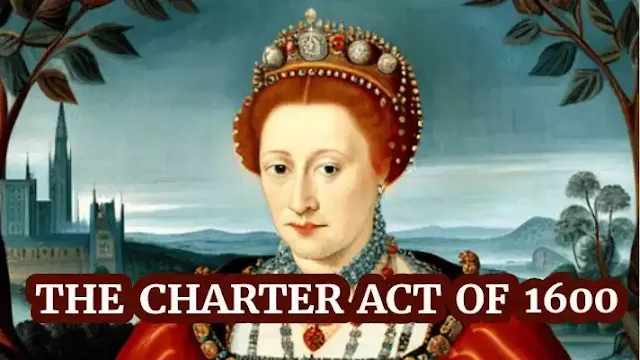Learn about the Charter Act of 1600 in UPSC's modern Indian history course, covering the political and constitutional history of India.
- What is the Charter Act of 1600?
- What are the Reasons for the company to get the Charter?
- Which Company got the charter?
- What are the major outcomes of the Charter Act of 1600?
- Legislative Power of the Company under the Charter Act of 1600?
- Election of Members of the Company
- Purpose of Election
- Drawbacks of the Charter Act of 1600
- Conditions for the Grant of the Charter
- Extension of Special Privileges and Monopoly Rights
THE CHARTER ACT OF 1600
The Portuguese discovery of the sea route to India and the consequent decline in the dominance of Arab merchants with East and the increase in profits from direct trade influenced the interest of many European countries in trade with India. They began coming to India to trade but later became involved in local politics. The influence of the East India Company on the political and constitutional history of India began with the Statutory Act of 1600
1. What is the Charter Act of 1600?
The Charter Act of 1600 was a Royal order given by Queen Elizabeth I of England to a Trading company formed by a group of members called "Merchant Adventures". It granted monopoly Rights and special privileges to the company in Asia and Africa.
2. What are the Reasons for the company to get the Charter?
The reasons were
- Special Privilege and Monopoly Trade Rights
- To make the Company constitution Powerful for Negotiation with Others
- To get State Aid in Case any need arises
- To get Protection from other Companies
- To survive the Competition from the European Counterparts
- To maintain discipline among its members and servants
These rights and Privileges' can be granted only through the charter because it was the constitutional practice of Britain
3. Which Company got the charter?
East India Company was formed by an association of members called "Merchant Adventurers" and it was provided to the company under the name "Governor and Company of Merchants of London trading into the East Indies"
4. What are the major outcomes of the Charter Act of 1600?
It Granted Exclusive Rights to Trade (Monopoly Trading Rights)
- Into and From the ports of East Indies countries like Asia and Africa
- Into and from all the islands, ports, havens, cities, creeks, Towns, and Places of Asia and Africa, America or any of them, beyond the Cape of Bona Esperenza (Cape of Good Hope) to the Strait of the Magellan.
5. Legislative Power of the Company under the Charter Act of 1600?
Legislative Powers were provided
- To Govern the Company
- To Advance the Company and Its Agents
- To Bring Discipline among its Servants
So the Company can make
- Reasonable Laws
- Constitutions
- Orders
- Ordinances
For those above-mentioned purposes, subject to the Law of the realm (kingdom), not contrary to it.
6. Election of Members of the Company
- A Governor
- Twenty-four Persons or Twenty-Four Committees
were to be elected among the shareholders of the Company annually
7. Purpose of Election
The purpose of Electing these persons is to
- To Supervise
- To manage
the affairs of the Company
8. Drawbacks of the Charter Act of 1600
- Capital of the Company
- Qualification for the Member for the Election
- Method of Election to Elect the Members
- Voting Power of the Members
were not provided in the Charter
9. Conditions for the Grant of the Charter
The Company must prove its Profitability to the Kingdom, If its Failed it will be determined on Two years Notice
10. Extension of Special Privileges and Monopoly Rights
The Charter Act of 1609 extended the Monopoly Rights Perpetually (Indefinitely) by James I, but subject to the Condition that it does not cause any injury to the Nation, and the same will be determined through a three-year Notice.
INDIAN CONSTITUTION LANDMARK JUDGEMENT SERIES (FOLLOW LINK)
| Related Topics Links |
|---|
| Charter Act of 1661 |
| Charter Act of 1669 |
| Charter Act of 1677 |
| Charter Act of 1683 |
| Charter Act of 1686 |








0 Comments